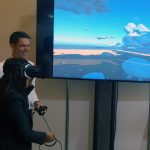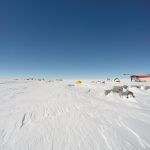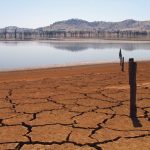 July 10, 2018 3:24 am
Published by Climate Extremes
July 10, 2018 3:24 am
Published by Climate Extremes
The ARC Centre of Excellence for Climate System Science had its send-off at Old Parliament House last week, with a showcase of seven years of amazing climate research. Our five research programs all had dazzling displays, ranging from 3D-printed cumulonimbus to virtual reality explorations of the Earth. Building the heartbeat I was invited to build some interactive pieces for the extremes research program. The first, built in collaboration with Dr Andrew King, is called The Heartbeat of Australian Extremes. It shows the... View Article
 April 12, 2018 7:56 am
Published by Climate Extremes
April 12, 2018 7:56 am
Published by Climate Extremes
The Centre of Excellence for Climate Extremes was officially launched on Tuesday, April 10, at the University of New South Wales (Sydney) by the Minister for Small and Family Business, the Workplace and Deregulation, The Hon. Craig Laundy MP.
 March 31, 2018 5:50 am
Published by Climate Extremes
March 31, 2018 5:50 am
Published by Climate Extremes
The foundations of our outreach program are now almost all in place for the Centre of Excellence for Climate Extremes. Our website is in place, social media is close to becoming more active and already Centre researchers are featuring prominently in the media.
 March 30, 2018 9:25 pm
Published by Climate Extremes
March 30, 2018 9:25 pm
Published by Climate Extremes
The first model submissions to CMIP6 are expected for later this year. It is then time to finalise the preparations to organise and maintain the CMIP6 dataset. NCI in collaboration with CLEX, the Bureau of Meteorology and the CSIRO in now working on the Climate and Weather Science Data Enhanced Virtual Laboratory (DEVL) project.
 March 30, 2018 8:06 am
Published by Climate Extremes
March 30, 2018 8:06 am
Published by Climate Extremes
It’s with a sense of excitement that I’m writing my first column as Chief Operations Officer for the ARC Centre of Excellence for Climate Extremes. It’s hard to believe that April is already upon us. So much has been happening over the past few months. And there’s plenty more to come, in particular our Centre launch celebration on April 10 at UNSW. I hope to see as many people there as can make it.
 March 30, 2018 7:23 am
Published by Climate Extremes
March 30, 2018 7:23 am
Published by Climate Extremes
The Mount Brown South ice-core drilling project in East Antarctica was successfully completed in the 2017/2018 summer season. Mount Brown is located approximately 340km from Davis station and at an elevation of over 2000 metres on the East Antarctic Plateau. The field project involved a team of eight who lived in tents and battled intense katabatic winds to retrieve the new ice core.
 March 30, 2018 6:37 am
Published by Climate Extremes
March 30, 2018 6:37 am
Published by Climate Extremes
Welcome to the Researcher Development Program in CLEX. “What is the Researcher Development Program” you ask? Well, this program recognises that development does not stop once you submit your PhD, and therefore offers development opportunities for all centre researchers. The program will include fundamental research and communication skills, professional development, mentoring and leadership opportunities and will complement opportunities offered at the nodes.
 March 30, 2018 6:28 am
Published by Climate Extremes
March 30, 2018 6:28 am
Published by Climate Extremes
The Climate Variability and Teleconnections research program is only in its formative stages but already the team has added a wealth of individual highlights since the Centre of Excellence for Climate Extremes started.
Three members of our team – Catia Domingues, Shayne McGregor and Joelle Gergis – have been named as Lead Authors for the next IPCC Working Group 1 report for the 6th Assessment Report (AR6), due to be released in 2021.
 March 30, 2018 6:21 am
Published by Climate Extremes
March 30, 2018 6:21 am
Published by Climate Extremes
In a major achievement, a version of the Australian community land model is now running in the ACCESS modelling system. This version includes the science advances led by Mark Decker around hydrology and soil evaporation, and the science advances led by Martin de Kauwe and Jatin Kala. It also includes major bug fixes identified by collaborators in the UK, and by colleagues in CSIRO. For the first time, we have a version of the Australian community land model coupled with an up to date version of the UK Meteorological Office’s atmosphere model.
 March 30, 2018 6:05 am
Published by Climate Extremes
March 30, 2018 6:05 am
Published by Climate Extremes
At this early stage in the research program, we have already seen significant progress on understanding how well temperature extremes can be simulated with CABLE coupled to the ACCESS system. Coupling has been improved and we have identified possible causes for the tendency for the model temperature to overstate extremes. This model focus will continue to be a priority in the early part of 2018.
The team has also identified specific continental heatwaves for initial investigation.










